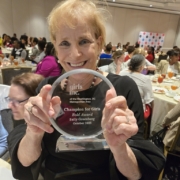A National Consumers League Review Finds the Promotion by Several Online Telehealth Platforms Misleads the Public About the Safety of Compounded GLP-1 Products and Violates FTC’s Prohibition Against False and Deceptive Advertising
Media Contact: Lisa McDonald, Vice President of Communications, 202-207-2829
Washington, DC, – Now that a Presidential memorandum directs the Food and Drug Administration (FDA) to ensure accuracy in direct-to-consumer prescription drug advertising and the September 9 MAHA Report calls on the Federal Trade Commission (FTC) to apply its existing authorities to DTC telehealth companies, the National Consumers League (NCL) and 12 patient safety, pharmacy, women’s health and minority health organizations have submitted a petition asking the FTC to launch an investigation of the deceptive marketing practices of telehealth platforms promoting weight loss drugs.
Reinforcing the July 17, 2025, letter to the FTC from Senator Marsha Blackburn (R-TN), urging a probe of the questionable online marketing surrounding GLP-1 agonists, the petition provides a roadmap for the FTC to investigate the direct-to-consumer advertising practices of telehealth platforms that promote compounded GLP-1 drugs through tactics that violate the FTC’s prohibition against false and deceptive advertising. These practices include ads that expose consumers to unsubstantiated claims and misleading inferences regarding the comparable safety, efficacy, and ingredients used in compounded GLP-1 products. As described in the petition, there has been a 1200 percent increase in “violative or problematic” GLP-1 related ads since 2022, resulting in an alarming amount of misleading information that causes consumer confusion, leads to risk-taking behaviors, and perpetuates fraud.
“Compounded GLP-1s are not the same as FDA-approved medications – and not knowing the differences puts American consumers at risk,” said Sally Greenberg, CEO of the National Consumers League (NCL). “The FTC must act swiftly to stop deceptive advertising and protect consumers from potentially serious health problems associated with compounded GLP-1 drugs.”
Based on an in-depth analysis NCL conducted in April 2025 of the headings, claims, omissions of fact, and use of visuals and hyperlinks contained in widely disseminated TV and digital ads promoting compounded GLP-1 drugs, these practices fall into three categories that violate the Federal Trade Commission Act: 1) ads that omit “material risk information,” such as side effects and contraindications, 2) content that contains statements and omissions that would mislead a reasonable consumer regarding FDA approval, and 3) unsubstantiated claims regarding product safety and efficacy. Some examples include:
- Broadcast and digital ads that completely omit all risk and safety information about compounded GLP-1 products
- Ads that only include brief, superimposed risk declaimers stating that GLP-1 drugs “may differ in risks, benefits, and side effects”
- Putting risk disclosure information in small, hard-to-read type and flashing it quickly in TV spots
- Making implied claims of FDA approval and/or the sameness with the branded drug by juxtaposing images of compounded drugs with easily recognized FDA-approved products, or stating that the compounded version has the “same active ingredient”
- Using terms like “clinically backed weight loss treatment,” “doctor trusted,” and “trusted by experts” with no substantiation
The following organizations joined with the National Consumers League in submitting the petition: Aimed Alliance, American Medical Women’s Association, Association for Safe Online Pharmacies, Center for Medicine in the Public Interest, Health Equity Coalition on Chronic Disease, HealthyWomen, League of United Latin American Citizens, MANA, A National Latina Organization, National Asian Pacific Center on Aging, National Council on Aging, National Hispanic Council on Aging, and the Partnership for Safe Medicines.
Because deceptive advertising too often deceives consumers into believing that compounded GLP-1s are as safe as branded versions, only cheaper and easier to obtain online, the petition documents the harm in serious health problems related to dosing errors and reactions to harmful ingredients in compounded GLP-1 products. As of September 9, 2025, the FDA has received 1,424 reports of adverse events associated with compounded GLP-1 drugs, including reports of 329 hospitalizations and 23 deaths, while poison control centers have seen a nearly 1,500 percent increase in calls since 2019 due to overdose or side effects.
Additionally, patient safety advocates warn that many compounded GLP-1s use active pharmaceutical ingredients (API) sourced from China, where quality standards vary and APIs may go uninspected. Further, the petition points to new health risks for consumers as compounders and telehealth companies pivot to promoting “personalized” versions of GLP-1s with added vitamins or microdoses of GLP-1s that have never been studied.
“When drug compounders use added substances or altered dosages to evade restrictions on copying FDA-approved medications, they endanger consumers by dispensing products that have not been proven safe or effective for their intended uses,” said Michael C. Barnes, counsel to Aimed Alliance. “By promoting and selling drugs that have not undergone rigorous clinical trials and FDA review, compounders also erode the integrity of the U.S. drug approval and marketing system.”
While deceptive advertising of compounded GLP-1 drugs is a national problem that perpetuates fraud, advocates are especially concerned about the influence of highly deceptive ads on women, the primary users of GLP-1 drugs, including girls 14 years and younger who are increasingly motivated to take microdoses of a GLP-1 drug to control their weight. However, those at greatest risk of harm are women of color, who the data show tend to be more susceptible to scams offering cheaper, potentially fraudulent or counterfeit alternatives online, through bodegas or illegitimate channels.
Additionally, the League of United Latin American Citizens (LULAC) asserts that Latinas are especially vulnerable to deceptive Spanish language ads on television, radio, and social media, as well as through informal networks – community centers, neighborhood bodegas, and Spanish language Facebook groups – where oversight is nonexistent.
“This is a worst-case scenario for the Latina community,” said Ray Romano, LULAC’s Director of Research and Policy. “For many Latinas, especially those with limited English proficiency, these ads may be their only source of information about compounded GLP-1 drugs. Latina patients are also desperate for affordable treatment, which is why this exploitative marketing creates an especially dangerous pipeline for fraud and harm.”
Study Methodology
Months in development, the petition draws on research on telehealth marketing of compounded GLP-1 products, including a content analysis conducted by the NCL of the headings, subheads, claims, omissions, and the placement of visuals in television and digital ads widely disseminated online in the first half of 2025. The petition also incorporates input from stakeholders focused on patient safety, consumer fraud, and populations especially vulnerable to online misinformation.
The full petition can be found here.
###
About the National Consumers League
The National Consumers League, founded in 1899, is America’s pioneer consumer organization. The organization’s mission is to protect and promote social and economic justice for consumers and workers in the United States and abroad. For more information, visit www.nclnet.org.

























